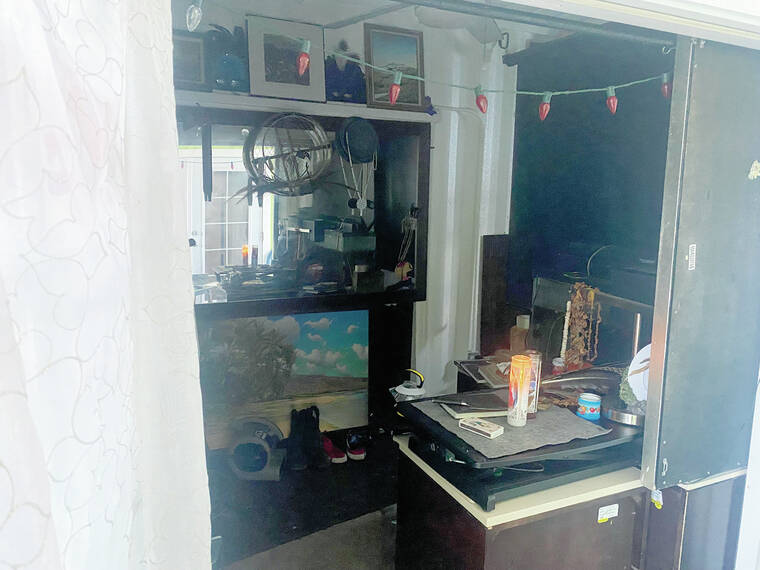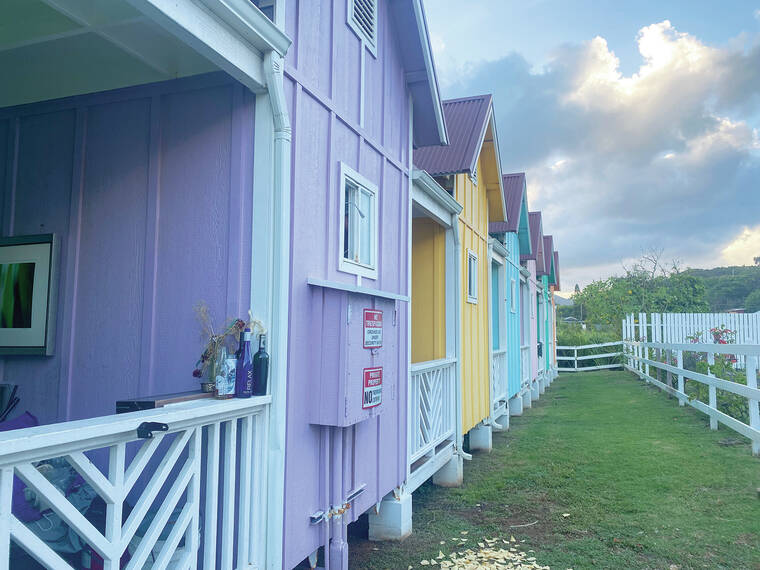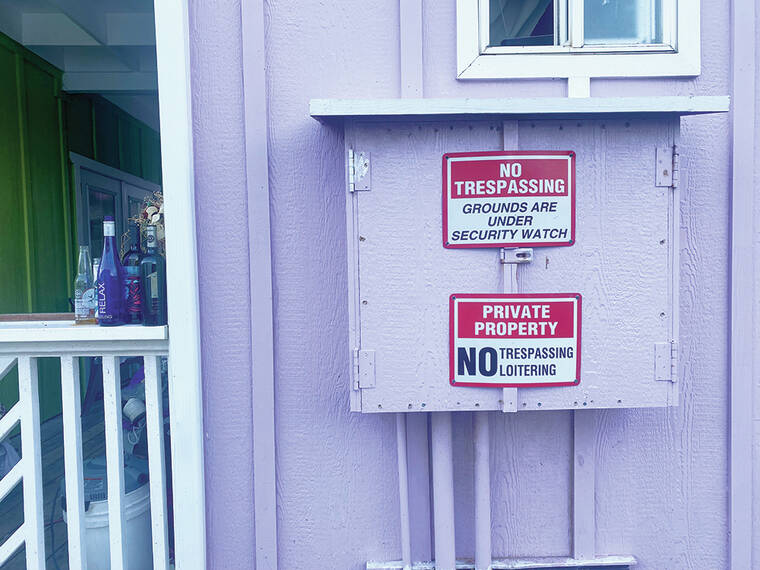KAPA‘A — The 14 modified shipping containers on the boardwalk of the NoKa Fair in Kapa‘a have housed more than a dozen people since late 2020.
Though originally intended as shop space, property owner South Pacific Bistro struggled to fill them with vendors as the COVID-19 pandemic shut down the tourism economy, and began renting them as apartments at $800 to $1,000 a month.
These properties are still zoned for commercial, not residential use, public tax records show — a fact which made them the subject of a Kaua‘i County Planning Department investigation that concluded last week.
“The investigation determined that the owner is coming into compliance, and therefore a notice of violation was not issued,” wrote Planning Director Ka‘aina Hull in a statement. “Should the property owner wish to convert the property to permitted residential use, we would work with him on the process to create safe, legal dwellings.”
“Coming into compliance” involves shutting down the apartments by Oct. 22 — leading to a series of evictions that have been hurried and often illegal.
‘Self-help’ evictions
Three eviction cases have been officially filed in court on behalf of NoKa Fair property owner South Pacific Bistro LLC and its President Jimmy Jasper, a Kaua‘i developer who owns property in Kapa‘a and Lihu‘e. Tenants report that everyone living in the containers, around a dozen people, have now received a notice to quit.
“Overall, it was a good idea. It could have provided housing for a lot of people had it been done right,” said one former tenant, a substitute teacher who due to
privacy concerns requested to be identified as B.B. “They could have really helped some people out.”
In Dec. 2020, B.B. became one of the first tenants to sign on to live in the storage container apartments, which she discovered through a Craigslist ad while searching for affordable housing. Though the 200-square-foot units lacked running water, she appreciated the comparatively low rents.
This May, she was one of the first tenants on the property to receive a notice to quit. Like other tenants, she had initially signed a long-term lease, which had since lapsed and gone month-to-month. Struggling to find a new place with limited notice, she elected to go through the legal eviction process.
Before the case was filed in court, B.B. reported the locks on the shared bathroom had been changed without warning. Though other tenants were given new keys, she was not, leaving her suddenly without bathroom access.
She left the apartment in August, and has since filed a small claim against the landlord because, she said, they did not return her $800 security deposit without cause. She was frustrated with Jasper’s actions, saying he “didn’t respect tenants.”
Jasper declined to comment.
Local musician Tim Todd — who has lived in one of the containers with his fiancé Erin Orshal since May 2021 — received a notice to quit in June.
While a court eviction was still in progress, Todd and Orshal’s electricity was shut off and their access to the bathrooms was restricted. A neighbor plugged in an extension cord to help them out, but Todd reported it was repeatedly cut.
“He’s been doing everything to bully us out without taking the legal route, which is very simple,” said Orshal.
Todd signed a mediation agreement in September, in which he and Orshal agreed to vacate the property by Oct. 22 in exchange for the property owners turning their electricity back on.
Another tenant, who wished to remain anonymous, also reported his electricity was shut off and his access to the bathrooms was limited before his eviction case made its way through the courts.
‘Completely illegal’
According to attorney Ray Kong, legal director at Lawyers for Equal Justice, actions like shutting access to the bathroom and turning off the electricity are “completely illegal.”
“The law really leans towards protecting the tenant until there’s a court order,” said Kong. “There’s a strict procedure that needs to happen.”
Kong clarified that this applies even in cases where the tenant’s lease had expired.
He explained that this tactic is used by landlords who want to avoid a drawn-out, court-eviction process, and it is sometimes used in cases where the apartments are not legally rented.
“A landlord might think, ‘If I’m already doing this under the table, I’m just going to keep it that way,’” Kong said.
With high rents throughout the island, many tenants are struggling to find a backup plan before the apartments are shut down on Oct. 22. Data published by Hawai‘i Realtors in June showed a 12 percent increase in home prices in 2022, with an average home selling for $1.2 million, and comparable bumps in rents for tenants.
Though Todd reported the landlords are assisting some in finding new housing, others, like he and Orshal, have not been so lucky.
“For us, I don’t see anything else except for living in a tent somewhere,” said Orshal.
•••
Guthrie Scrimgeour, reporter, can be reached at 808-647-0329 or gscrimgeour@thegardenisland.com.








Not surprised at all about the tactics by Jasper but the housing situation is beyond critical. We saw tent cities during the height of covid and now it appears we will see them again. And remember council members who would not allow citizens to vote on the option to set aside 2% of county funds for housing!
The owner can do the right by leasing the property to Catholic Charities to manage and convert the zoning for Housing first program that is used throughout the world and especially in Finland to house chronically homeless people.
Mahalo
Shame on you Jimmy. You have so much and have repeatedly been selfish and cruel to hard working Kauai business owners and low income residents. You should be helping people less fortunate, not throwing them out on the street after benefiting from them. Shame.
I was a tenant there and can attest to the terrible treatment, endured by most everyone who lives there, at the hands of the Jaspers; from verbal harassment & slander to the cutting off of utilities & reduction of facilities (ie from 3 to just ONE shower to be shared by all the residents.)
I’ve witnessed Jimmy Jasper throw a tenant’s personal belongings over the railing of his lanai because of an unwritten rule that no personal items are allowed anywhere outside the units (in an effort to hide the fact that they were being rented as residential units on a commercially zoned property.)
I saw- more than once- Jimmy retaliate against an employee, who was also a tenant, by first firing them and then evicting them a week or two later.
Tenants have been timed in & then harassed upon exiting the restroom, and guests of tenants have been yelled at & chased off the property, in the middle of the day, because Jimmy has some beef with a particular tenant.
When Mr. Jasper decided to rent those containers as residential units it was with the knowledge that it would only be temporary; the zoning board was not enforcing certain rules for the purpose of getting as many people housed during the pandemic as possible. This could be seen as commendable on Jasper’s part, if he had been upfront & honest with potential renters. Instead he chose to fill every vacancy, collecting guaranteed rent via covid rental assistance programs, and as soon as the zoning laws went back into full effect he non ceremoniously, with no notice or explanation, gave us all the boot.
Since then he has hired security guards who every night are not to allow ANY guest on the property from 11pm-6am. He also pointed out the “trouble maker” tenants who need to be “dealt with” (by security) should they remain after October 20- even though our last day is actually October 22.
Something not mentioned in the article is that the tenant who shared his power via extension cord- after Jimmy had illegally shut it off to another unit- also had HIS power cut. It also remained that way for over a month, requiring court filings & an order from a judge before Jasper finally switched it back on. Keep in mind this all happened during the hottest time of the year to people living in metal shipping containers.
Anyone concerned with basic human rights, respect for others, as well as the growing homeless population should take note of Jasper and all land owners like him. He has put so many hardworking people through undue stress, hardship, and upheaval, and for seemingly no reason other than to take advantage of covid relief funds that are intended to HELP people.
The end result is further strain on the rental market and even more Kauai residents sent down that slippery slope of homelessness, which is detrimental to every aspect of our community.